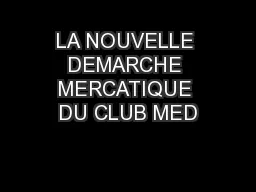PDF-[EBOOK] - Med School Rx: Getting In, Getting Through, and Getting On with Doctoring
Author : BarreraEdwards | Published Date : 2021-12-21
This is the essential reference for the complete medical school experience by a professional medical educator who wants students of the future to set a new standard
Presentation Embed Code
Download Presentation
Download Presentation The PPT/PDF document "[EBOOK] - Med School Rx: Getting In, Ge..." is the property of its rightful owner. Permission is granted to download and print the materials on this website for personal, non-commercial use only, and to display it on your personal computer provided you do not modify the materials and that you retain all copyright notices contained in the materials. By downloading content from our website, you accept the terms of this agreement.
[EBOOK] - Med School Rx: Getting In, Getting Through, and Getting On with Doctoring: Transcript
Download Rules Of Document
"[EBOOK] - Med School Rx: Getting In, Getting Through, and Getting On with Doctoring"The content belongs to its owner. You may download and print it for personal use, without modification, and keep all copyright notices. By downloading, you agree to these terms.
Related Documents

![PDF-[EBOOK] - Med School Rx: Getting In, Getting Through, and Getting On with Doctoring](https://thumbs.docslides.com/906464/ebook-med-school-rx-getting-in-getting-through-and-getting-on-with-doctoring-l.jpg)







![[DOWNLOAD] - Med School Rx: Getting In, Getting Through, and Getting On with Doctoring](https://thumbs.docslides.com/902921/download-med-school-rx-getting-in-getting-through-and-getting-on-with-doctoring.jpg)




